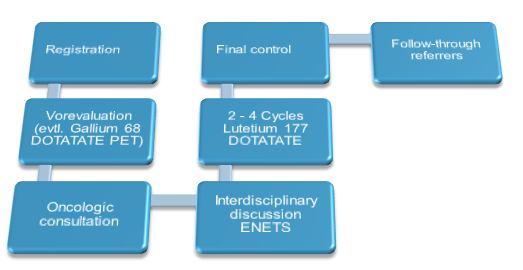Overview
In addition to many possible therapies, USZ offers the radiopeptide therapy with Lutethium-177-DOTATATE. This therapy is similar to Octreotide or Lanreatide with the compound binding to Somatostatin receptor 2 in order to irradiate the tumor cells locally. The therapy is usally applied over four cycles every 8 weeks. The patient is seen once by the oncologist between the cycles and after the end of therapy, the patient is referred back to his physician.
Risks
The risk for untoward reactions during this type of radiation therapy iss mall. Most patients do not feel any restrictions as a result. The radioactive element Lutetium-177 irradiates only tissue in within 4 mm of its presence. As it fixes in the tumor, little normal surrounding tissue is irradiated alongside.
Procedure of therapy
Lutetium-177 DOTATATE is partly taken up by the kidney very much like amino acids. In order to avoid renal damage, the kidneys have to be blocked for the DOTATATE compound. This is done by intravenously applying a solution of amino acids. The infusion is usually tolerated without side effects and is not harmful to the kidneys. Nevertheless there is a small risk of kidney damage by Lutetium-177 DOTATATE. In very rare cases this can lead all the way to a dependence on renal dialysis. Studies have shown that this happens in less than half a percent of patients and most of these patients suffered from pre-existing renal disease.
While injecting DOTATATE, patients may experience some nausea and vomiting of short duration (5 min) and this occurs in approximately 5% of patients. The ensuing stay for therapy is usually tolerated without other untoward effects. During therapy 30% of patients exhibit a slight decrease in white blood cells, but the recovery occurs in just a few weeks.



